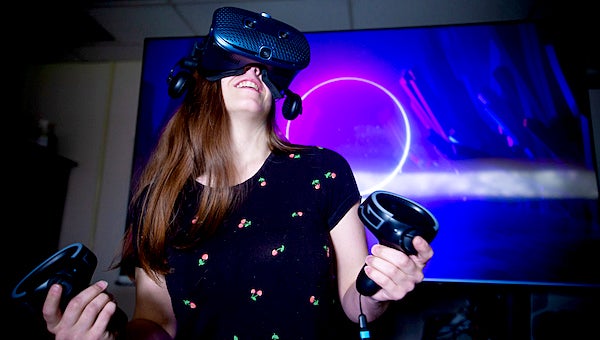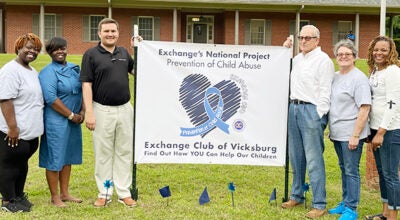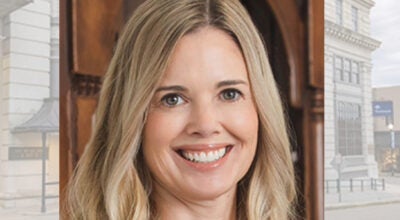Students building new realities for their careers in new program at Hinds
Published 3:41 pm Tuesday, March 23, 2021

- Sarah Archie views her creations in Extended Reality class in a virtual environment using a headset and controllers (Hinds Community College/April Garon)
RAYMOND – Imagine being able to eat the tastiest breakfast, hold a medieval sword or simply tour your new workspace — before any of it actually exists.
Students in the inaugural Extended Reality, or XR, class at Hinds Community College are learning skills that can take them far beyond the classroom and into a growing niche in the workforce.
“We are trying to move the students beyond thinking about XR as being just a mechanic for video gaming and open their eyes to the many possibilities that XR has in the workforce,” said James Finch, one of two instructors in the program. “Industries that deal with XR more and more include construction, medical simulations, automotive engineering, architectural design and more.”
Finch and fellow instructor Jake Cockrell are teaching the first of a two-part look into XR for Hinds students. Part one deals with the concepts of Virtual Reality (VR), Augmented Reality (AR) and Mixed Reality (MR). Students create 3D models of an array of items and add texture and animation as they go. Then, it’s time to break out the familiar headsets associated with VR and watch their creations come alive.
Sarah Archie, 22, of Vicksburg, among the eight students in the class, enjoyed her virtual donut and coffee, then moved on to forging a medieval sword using the latest virtual software.
“I’ve always been a bit on the creative side and have been into computers almost since I could walk,” said Archie, who is on track to earn an associate degree in Computer Programming Technology next fall. “I have my own personal VR equipment at home, but before, I was just casually playing games with it. Now I’m enjoying 3D modeling. Incorporating that into VR would be amazing.”
Next fall, students who enroll in the next step will learn to take 3D models and apply them to a virtual environment that allows the user to program their objects to act in a virtual space.
“Those objects can be programmed to respond to touch, be picked up, moved, interact with other objects, among other things,” Cockrell said.
Students in the first part of the program are those already in an Information Systems Technology-related course of study. Those include Computer Networking, Cyber Security, Computer Programming and Software Engineering. Coding skills taught in first-semester courses in each are a must for the XR class.
Funding for equipment that made the XR class possible was provided by a grant through the U.S. Department of Agriculture in partnership with the Mississippi Community College Board.
Advances in VR and XR technology can only help the program grow and supply multiple industries with a new breed of in-demand specialists. That specialization grew this past summer to include the first approved method of using AR technology in spinal surgery, Finch said.
“Also, a former student who graduated some years ago — before we got the controllers and software we use now — was hired by a large construction company who has now taken 3D blueprints and put them into a virtual environment,” he said. “It allows their clients to literally walk around their building before it was built.
“We are trying to help with innovation not only for our program but hopefully, in the future, all programs.”





